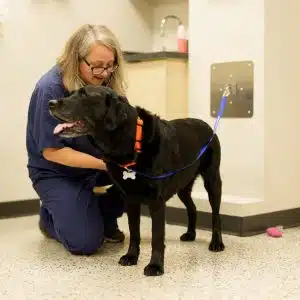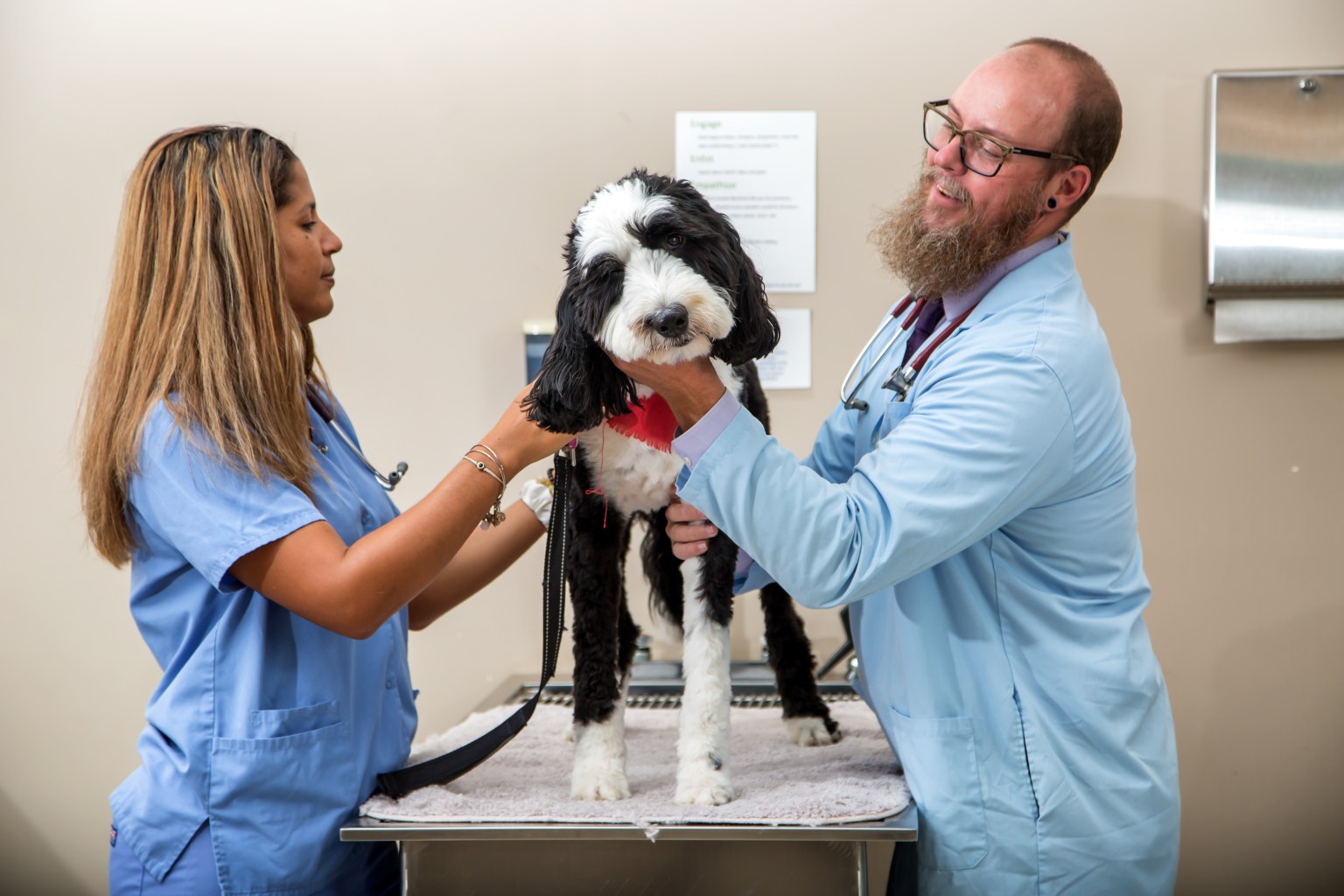Veterinary Oncology Services vs. general pet care for tumor patients
How a Vet Oncologist Can Assist Improve Your Family pet's Quality of Life
Vet oncologists focus on the diagnosis and treatment of cancer in pets, playing a critical function in enhancing their lifestyle. They produce individualized therapy strategies that attend to the distinct demands of each pet. Through sophisticated diagnostics and targeted treatments, these experts intend to take care of signs and symptoms successfully. The journey does not end there. Discovering the full spectrum of treatment options discloses more about how these experts can make a significant distinction.

Understanding the Function of a Veterinary Oncologist

Along with diagnosis, veterinary oncologists develop thorough treatment methods customized to the demands of each family pet. These approaches may include chemotherapy, radiation treatment, and surgical interventions, aimed at not only expanding survival however also boosting the overall lifestyle. In addition, they supply palliative care, concentrating on pain monitoring and convenience for pet dogs encountering incurable diagnoses. By collaborating with animal owners, vet oncologists ensure that pet dogs obtain the most effective and thoughtful treatment possible throughout their cancer trip.
Tailored Therapy Prepare For Your Pet
When a pet is detected with cancer cells, establishing a tailored therapy strategy becomes important for addressing their one-of-a-kind requirements and scenarios. A veterinary oncologist very carefully assesses the kind of cancer cells, its stage, and the total health and wellness of the pet dog. This comprehensive evaluation enables the creation of a customized strategy that might consist of a mix of surgical procedure, radiation, and radiation treatment therapy.
The oncologist also thinks about the pet owner's preferences and way of life, making sure that the plan straightens with their goals for their family pet's treatment. Pet Cancer Surgery. Treatment strategies are not static; they are routinely evaluated and changed based upon the animal's feedback and any kind of emerging demands. By concentrating on personalized care, vet oncologists intend to boost the performance of therapies while keeping the pet's lifestyle. This tailored method fosters a far better understanding of the condition, encouraging pet owners to make informed decisions about their beloved friends' health and wellness
Handling Signs And Symptoms and Adverse Effects
Handling the signs and side impacts of cancer cells therapy is an essential element of veterinary oncology. Vet oncologists use a selection of strategies to alleviate discomfort and boost the overall well-being of pet dogs undertaking treatment. This might include making use of anti-nausea medicines to deal with throwing up and loss of hunger, which prevail negative effects of radiation treatment. Pain monitoring is also focused on, usually entailing the prescription of anesthetics customized to the animal's certain requirements.
In addition, oncologists might recommend dietary modifications, integrating high-quality, conveniently absorbable foods to support nutritional intake. Monitoring blood job is crucial to discover any adverse responses to treatment early, enabling prompt interventions. Routine follow-ups make it possible for the veterinary group to assess the animal's reaction to therapy and make required adjustments. Via these thorough methods, vet oncologists aim to boost the lifestyle for pet dogs facing cancer cells treatment challenges.
Palliative Treatment and Convenience Procedures
Palliative care plays a critical role in improving the high quality of life for pets identified with his explanation cancer, focusing on comfort and psychological support instead of medicinal treatment. Veterinary oncologists focus on pain monitoring, guaranteeing that pet dogs experience marginal discomfort during their illness. This consists of making use of analgesics, anti-nausea drugs, and various other therapies customized to private requirements.
Along with medicinal treatments, ecological alterations can considerably improve a pet dog's high quality of life. Creating a calmness, comfortable room with soft bed linens and very easy accessibility to food and water can reduce stress and anxiety. Nutritional assistance is likewise essential; oncologists might recommend customized diets that accommodate the animal's choices and requirements.
Emotional assistance for both the family pet and its owners is crucial. Veterinary oncologists supply assistance on dealing approaches, aiding family members browse the psychological difficulties that go along with a cancer cells medical diagnosis. Eventually, palliative treatment goals to guarantee that animals receive the dignity and comfort they are worthy of.
Working together With Your Routine Veterinarian
Cooperation with a normal veterinarian is crucial for maximizing the care of family pets with cancer, as this collaboration guarantees an extensive technique to therapy and high quality of life. The regular vet generally has an in-depth understanding of the animal's case history, which is vital when developing a therapy plan. They can efficiently connect with the veterinary oncologist, making certain that all facets of the pet's wellness are thought about.
This partnership enables coordinated care, which may include regular check-ups, monitoring adverse effects, and readjusting medicines as needed. Routine vets can likewise offer emotional assistance to family pet owners, visit our website helping them navigate the intricacies of cancer cells therapy - Pet Cancer Surgery. By functioning closely with vet oncologists, they can promote a seamless shift between different kinds of care, making sure that pet dogs receive the most effective treatments while maintaining their comfort and well-being throughout the process. With each other, they boost the overall lifestyle for family pets facing cancer cells
Often Asked Concerns

What Sorts of Cancers Cells Do Vet Oncologists Generally Treat in Pet Dogs?
Veterinary oncologists commonly deal with various cancers in pets, including lymphoma, pole cell growths, osteosarcoma, and soft cells sarcomas. These specialists utilize advanced diagnostic methods and therapy choices to address the certain demands of each animal.
Exactly How Can I Prepare My Pet for a Vet Oncology Appointment?
Preparing a pet dog for a veterinary oncology consultation involves celebration medical records, keeping in mind signs, and preparing questions. Making certain the animal is comfortable and tranquil during traveling can also greatly boost the overall experience and consultation performance.
Exist Any Kind Of Different Treatments for Animals With Cancer?
Alternative treatments for animals with cancer frequently consist of acupuncture, natural medication, and dietary support. These methods might enhance standard therapies, possibly enhancing general well-being and offering supportive treatment during the family pet's cancer trip.
Exactly how Commonly Should My Pet See the Vet Oncologist?
The regularity of brows through to a veterinary oncologist typically depends on the pet dog's certain problem and treatment plan. Routine analyses might be advised every couple of weeks or months to check progress and change treatments as necessary.
What Expenses Are Associated With Vet Oncology Providers?
Prices connected with vet oncology solutions can vary commonly, including preliminary assessments, diagnostic tests, therapy strategies, and continuous treatment. Veterinary Oncologist. Pet proprietors should plan for potential expenses that mirror the intricacy and period of the treatment required
Veterinary oncologists specialize in the diagnosis and treatment of cancer cells in pets, playing a crucial role in boosting their quality of life. Lots of animal owners might not be acquainted with the complexities of veterinary oncology, understanding the duty of a vet oncologist is essential for taking care of cancer in pets. The oncologist also takes into consideration the pet owner's preferences and way of have a peek at these guys living, making sure that the strategy straightens with their objectives for their pet's care. By concentrating on customized treatment, veterinary oncologists aim to improve the performance of treatments while maintaining the pet dog's high quality of life. By working closely with vet oncologists, they can promote a seamless shift between different types of care, making certain that pet dogs receive the most efficient treatments while preserving their comfort and wellness throughout the process.